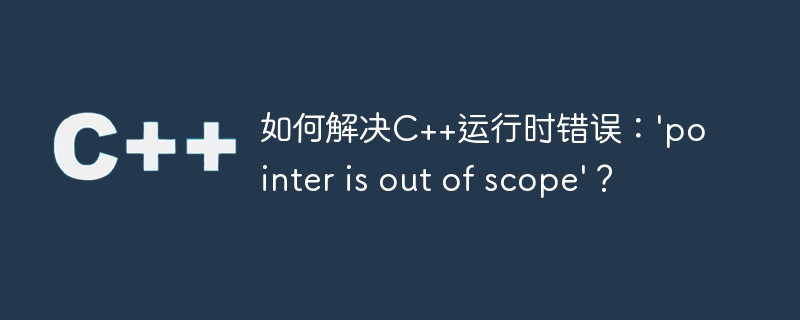

How to solve C runtime error: 'pointer is out of scope'?
In C programming, various runtime errors are often encountered. One of the more common problems is "pointer is out of scope", that is, the pointer exceeds its scope. This error can crash the program or produce unpredictable results. This article will explore the cause of this error and provide some solutions and code examples to help readers solve this problem.
First, let’s understand why the “pointer is out of scope” error occurs. When we use pointers in C, a pointer variable holds a value that points to a specific memory address. However, every variable has its scope, that is, the range within the program within which it is valid. When this range is exceeded, the variable is no longer valid and the pointer points to an invalid address, causing an error.
A common situation where "pointer is out of scope" errors occur is when using local variables in a function and then returning the pointer to the calling function. Here is an example:
#include <iostream>
using namespace std;
int* createInt() {
int num = 10;
return #
}
int main() {
int* ptr = createInt();
cout << *ptr << endl;
return 0;
}In this example, the function createInt() returns a pointer to the local variable num. However, when the function is executed, num goes out of scope and is destroyed. The address pointed to by the pointer ptr will no longer be valid, so the "pointer is out of scope" error will occur. .
To solve this problem, a common method is to use heap memory instead of stack memory to store data. Pointers corresponding to heap memory can be passed between different scopes because their lifetime is not limited. Here is a modified example code:
#include <iostream>
using namespace std;
int* createInt() {
int* num = new int(10);
return num;
}
int main() {
int* ptr = createInt();
cout << *ptr << endl;
delete ptr; // 在使用完动态分配的内存后,需手动释放内存
return 0;
} In this example, we use the new keyword to dynamically allocate an integer and return a pointer to the integer. Since this integer is allocated in heap memory, its lifetime is not limited by the scope of the function. In this way, we solved the "pointer is out of scope" error.
In addition, in order to avoid memory leaks, we need to manually release the heap memory after using it. At the end of the sample code, we use the delete operator to free the memory.
In addition to using heap memory, there are other ways to solve the "pointer is out of scope" error. For example, you can pass a pointer as a function parameter, or use static variables in a function. These methods can make the lifetime of the pointer exceed the scope of the function, thereby solving the error.
In short, in C programming, it is very common to encounter the "pointer is out of scope" error. By understanding the cause and taking appropriate solutions, we can avoid this mistake. Using heap memory, passing pointers, using static variables, etc. are all effective ways to solve this problem.
We hope that the solutions and sample code provided in this article can help readers better understand and solve the "pointer is out of scope" error. Mistakes are inevitable on the road to programming, but the ability to solve problems is equally important. I wish everyone will make more and more progress in C programming!
The above is the detailed content of How to solve C++ runtime error: 'pointer is out of scope'?. For more information, please follow other related articles on the PHP Chinese website!
 What are the differences between c++ and c language
What are the differences between c++ and c language
 Recommended learning order for c++ and python
Recommended learning order for c++ and python
 Cost-effectiveness analysis of learning python and c++
Cost-effectiveness analysis of learning python and c++
 Is c language the same as c++?
Is c language the same as c++?
 Which is better to learn first, c language or c++?
Which is better to learn first, c language or c++?
 The difference and connection between c language and c++
The difference and connection between c language and c++
 C++ software Chinese change tutorial
C++ software Chinese change tutorial
 Cost-effectiveness analysis of learning python, java and c++
Cost-effectiveness analysis of learning python, java and c++




